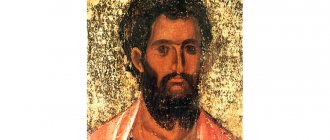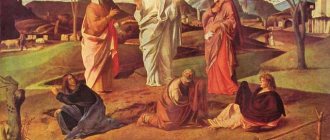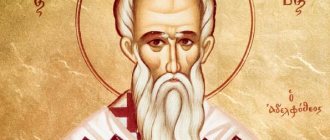| Hieromartyr James, Apostle of the 70, Bishop of Jerusalem. |
James, brother of the Lord
(+ approx.), Apostle from the 70th, Bishop of Jerusalem, Hieromartyr Memory October 23, December 1 - transfer of relics in 351 (Greek [1]), on the Sunday after the Nativity of Christ, in the Cathedrals of the Most Holy Theotokos and the Seventy Apostles
According to legend, he was the son of the righteous Joseph the Betrothed from his first wife, the brother of the apostles Judas from the 12th group and Josiah from the 70th group, and was also called Jacob the lesser or small (Mark 15:40) [2]. From his youth he loved a strict life and became a Nazirite, devoting himself to God and observing strict abstinence.
The Holy Apostle John the Theologian writes in his Gospel: “ Neither His brothers believed in Him
"(John 7:5). Saint Theophylact of Bulgaria explains these words this way: at the beginning of the earthly ministry of the Lord Jesus Christ, the sons of Joseph did not believe in His Divine essence. When the righteous Joseph the Betrothed, returning from Egypt, began to divide the land that belonged to him among his sons, he wished to allocate a part to Christ the Savior. The brothers opposed this, and only the eldest of them, James, accepted Christ Jesus into joint ownership of his share and for this was called the brother of the Lord. Later, when Judas believed in Christ the Savior, out of humility he called himself only the brother of Jacob. Another reason why Jacob is called the brother of God was that he accompanied the incarnate Christ, the Most Pure Mother of God and Saint Joseph when they fled to Egypt.
When the Savior began to teach the people about the Kingdom of God, Saint James believed in Christ and began to lead an even more strict and pious life. And the Lord especially loved Saint James. Thus, after His resurrection from the dead, Christ appeared separately from the other apostles to James, His brother according to the flesh (1 Cor. 15:7). Tradition adds that during the passion of Christ, the Apostle James hid in one cave, in the valley of Jehoshaphat, having vowed not to eat food until the Lord rose from the dead, and that the Lord, after His resurrection, honored him with His special appearance in this the cave itself.
Seeing his righteous life, Jacob was called righteous, and he was numbered among the seventy apostles. According to Clement of Alexandria, Eusebius of Caesarea and other ancient writers, after the ascension of the Savior, the apostles Peter, James Zebedee and John, although preferred by the Lord, did not argue about honor, but chose Saint James as bishop and primate of the Church of Jerusalem - the mother of Christian churches, according to his pre-election and appointment to this ministry by Christ Himself. Shepherding the flock of Christ in Jerusalem, during the thirty years of his priesthood, he converted many Jews and Greeks with his teachings to God and set them on the right path. Even the infidels treated Saint James with great respect and reverence for his virtuous life: the high priests, entering the Holy of Holies only once a year to perform services, did not prevent the righteous man from entering there and praying. Often, not only during the day, but even at night, Jacob entered the Holy of Holies and here, falling on his face, with tears he offered prayers to the Lord for the whole world. Seeing the purity of his immaculate life, they even began to call him Obli
or
Ofli
, which means: “fence, affirmation to people,” or they called him the most righteous of all. Saint James presided over the Apostolic Council in Jerusalem and his word was decisive (Acts 15).
The Holy Apostle James compiled the Divine Liturgy, which formed the basis of the liturgies compiled by Saints Basil the Great and John Chrysostom. The Church also preserved the Epistle of the Apostle, which under his name is included in the books of the Holy Scriptures of the New Testament.
| Ap. Jacob. Miniature Minology of Vasily II. Constantinople. 985 Vatican Library. Rome. |
All the people loved Jacob because of his holiness;
many of the elders of the Jews believed in the doctrine that he preached, and everyone enjoyed listening to him; many people gathered to see him: some wanting to hear his teaching, others wanting to touch the hem of his robe. At this time, Ananias became the bishop of Judea. Seeing that all the people were listening attentively to the teachings of Jacob, and many were turning to Christ, Ananias with the scribes and Pharisees, out of envy of the saint, were angry with him and decided to destroy him. They planned to ask the saint to turn people away from Christ with his teaching, and if he refused, to kill him. Elevating the saint to the roof of the temple, they called on him to renounce the Savior of the world and teach the people against Christ. But the holy apostle began to loudly testify that Jesus is the True Messiah. Then the Jewish teachers pushed the righteous man down. The saint did not die immediately, but, having gathered his last strength, he prayed to the Lord for his enemies, who at that time were finishing him off with stones, and finally crushed his head. The martyrdom of Saint James occurred about a year ago. St. Demetrius of Rostov notes [3] that the Apostle James died as a martyr in the 66th year of his life, and received the bishopric at the age of 34, after the Ascension of the Lord, from which it turns out that James was a year older than Jesus Christ.
Reverence
Saint James was buried at the place of his death. Subsequently, a monument stood over his grave near the temple. According to Origen, the murder of Jacob, which happened shortly before the Jewish War, made such an impression on the Jews that the subsequent disasters and destruction of Jerusalem were considered by them to be God's punishment for the death of the righteous.
In the first centuries of Christianity, the cave where the saint fasted during the Passion of the Lord was turned into a temple, and it was shown to pious pilgrims.
In 351, the Apostle James appeared in a night vision to the holy hermit Epiphanius, who lived in the Kidron Valley, and addressed him with the words: “Go to the archbishop and tell him to send to pick up our bodies.” When the monk asked the guest to give his name, he replied: “I am Jacob, brother of the Lord, and with me are Simeon and Zechariah,” and disappeared from sight. Seized by doubts and thinking that all this, perhaps, was the machinations of the evil one, Epiphanius did not dare to do anything. The next night the saint again appeared to the hermit and addressed the same words, but he was still in doubt. On the third night, the holy apostle repeated the order, this time threatening the monk with punishment. Then Epiphanius, in fear, went to the archbishop, Saint Cyril, and told him everything. Taking several people with him, the archpastor went to the indicated place and ordered the earth to be dug up. Soon the bodies of the saints were found, shining like bright lamps. The relics were solemnly transferred to Mount Zion and placed in the place indicated by St. Cyril. Then one noble man from Eleutheropolis erected a temple in their honor on this site [4].
In the century, Saint Theophan the hymnist, Archbishop of Nicaea, Blessed George of Nicomedia, and later Byzantium, wrote many hymns in honor of the Apostle James, which are used in the Church to this day.
When the Russian pilgrim Anthony visited Constantinople in 1200, he found here the relics of the Apostle James in the chapel of the Chalcopratian temple, and the head in the temple of the holy apostles. Currently, his relics, according to some sources, are in Rome in the Church of the 12 Apostles. In Moscow, at the Old Jerusalem Compound, part of his relics was preserved, sent by the Patriarch of Alexandria Hierotheos in 1853.
Apostle James, brother of the Lord
Saint James was the first of the apostles to whom our Lord Jesus Christ appeared after His resurrection from the dead. The Church calls the Apostle James the brother of the Lord, and his memory is celebrated on November 5/October 23, January 13/December 31 and January 17/January 4.
He was the son of the righteous Joseph from his first marriage. The Apostle Paul in his letter to the Galatians called him the brother of the Lord, saying: But I saw none other of the apostles except James the brother of the Lord (Gal. 1:19). Jacob himself led an ascetic life, not drinking alcohol, limiting himself in food and amenities. He also spent a lot of time in prayer. In Israel, such people were called Nazarenes (these are people who dedicated themselves to God by vow). Jacob believed in Christ during His preaching, and after that his life became even more strict. He was elected one of the seventy apostles after the Ascension of the Lord and for thirty years led the Jerusalem Church, becoming its first bishop.
According to legend, Christ, after His Ascension, appeared to Jacob and appointed him to this position. Being the primate of the Jerusalem Church, James also headed the Apostolic Council (around the fiftieth year), where it was decided on what conditions to accept the pagans into a new faith for them - Christianity.
It is noteworthy that it was Jacob, a well-known ascetic and ascetic, who showed wisdom and did not burden the former pagans with additional requirements for observing the Mosaic Law: Therefore, I decide not to make it difficult for the pagans who turn to God, but to write to them so that they abstain from what is defiled by idols, from fornication, strangulation and blood, and so that they do not do to others what they do not want for themselves (Acts 15: 19, 20).
James wrote the first sequence of the liturgy, which was called the “Liturgy of the Apostle James.” Subsequently, it was preserved only in the Jerusalem Church. In the 4th century, Saints Basil the Great and John Chrysostom shortened the Liturgy of the Apostle James. Based on it, they compiled their own rites, which we use to this day. But in Russia, the Liturgy of the Apostle James was unknown until the 20th century. It was served for the first time at the Leningrad Theological Academy in 1970.
Also, around 59, Jacob wrote a conciliar Epistle to all the Israelis, which was included in the book of the Apostolic Epistles. To support newly converted Jews and strengthen their faith is his main goal, and also to remind them that “Faith without works is dead.” This quote from the Epistle of the Apostle James is probably known to everyone. The Apostle James enjoyed great respect and authority among both pagans and Jews, many of whom he converted to Christianity.
But, like many of the apostles, James suffered martyrdom. The scribes and Pharisees decided to kill him. There was no ruler in Jerusalem at that time, since after the death of the previous one, a new one had not yet been sent from Rome. It was a “lucky” moment. The Jewish bishop Ananias led Jacob to the roof of the Temple. Here Jacob was to preach a sermon to the people. But when the holy apostle spoke about Christ, the attackers threw him down. There the crowd stoned the wounded apostle...
5.11.2018
Prayers
Troparion, tone 2
As a disciple of the Lord, you have received, righteously, the Gospel, / as a martyr and masha, even indescribable, / as a brother of God, as you have boldness, / as a hierarch, / as a hierarch, pray God save our souls
.
Kontakion, tone 4
(Similar to: Ascended:)
Father's Only Begotten Word, who came to us/ in the last days, the Divine Jacob:/ first showed you to the people of Jerusalem a shepherd and teacher,/ and a faithful builder of spiritual sacraments.// Thus We all honor you, Apostle
.
Call to Ministry
“And having gone thence a little way, He saw James Zebedee and John his brother also in a boat mending nets; and also called them. And they, leaving their father Zebedee in the boat with the workers, followed Him.”
(Mark 1:19–20)
- this is how the Gospel of Mark describes the calling of James and John, simple fishermen from Galilee by Christ, called by Him “sons of thunder” (Aram. “Boanerges”)
for their hot temperament and impetuous disposition, which were fully manifested when they wanted to bring fire down from heaven onto the village of the Samaritans,
(Luke 9:54)
and also in a request to allow
they should sit in the Kingdom of Heaven on the right and left sides of Jesus Christ.
(Mark 10:35)
Preachers of Christ's teachings
We learn about the activities to which the Apostle James Zebedee devoted himself after the Resurrection and Ascension of Jesus Christ from the pages of another book included in the New Testament. This is the Acts of the Apostles. It tells how, filled with the Holy Spirit, which descended on the apostles on the fiftieth day after the Ascension of Jesus (the Feast of Pentecost), he and other disciples of Christ worked on the establishment of the first Christian communities.
To preach the word of God, each of them was destined for their own path. The Apostle James Zebedee, whose life was written shortly after his death, was engaged in missionary work among the inhabitants of Spain, who at that time were drowning in the darkness of paganism. Returning then to Judea, the disciple of Jesus Christ continued to boldly declare Him as the Savior of the world, confirming his words with excerpts from the Holy Scriptures.
Preaching in the synagogues and squares of Jerusalem, he invariably attracted crowds of listeners. Many of them, heeding his simple and wise words that reached to the depths of their hearts, turned to a new faith and secretly received baptism from everyone. It was from them that the first communities subsequently emerged, thanks to which Christianity turned from a catacomb church into a leading world religion.
Execution of a disciple of Christ
Sacred Tradition tells of the martyrdom, which in 44 A.D. became the crown of the earthly life of Jacob Zebedee. The enemies of the holy apostle, who remained deaf to his divinely inspired sermons, convinced King Herod Agrippa I, who ruled in those days, to arrest James, whom he hated, and put him on trial for trampling the foundations of the Jewish faith.
The trial was quick and unfair. The apostle, sentenced to death, even in the last minutes of his life, continued to testify to his executioners about the great mission of Jesus Christ. The angry king, drawing his sword, cut off his head with his own hands. This tragic episode is mentioned in the book “The Acts of the Apostles” (2:1-4). By the way, James Zebedee is the only apostle whose death is described in the New Testament.
The Last Journey of the Apostle James
Further, Holy Tradition says that after the execution, the remains of the holy martyr were, by order of King Herod Agrippa, placed in a boat, which was launched on the waves of the Mediterranean Sea. But the Lord did not allow the relics of His disciple to disappear without a trace.
After some time, driven by an unknown force, the boat safely reached the shores of Spain in the place where the fiery sermons of the Apostle James once sounded, and was thrown ashore by the waves. There she lay, hidden from human eyes, for several centuries.
"Sons of Thunder"
The Gospels from Matthew (4:21) and Mark (1:19) describe the scene of the calling of the future apostles James Zebedee and his younger brother John the Theologian to serve by Jesus Christ. Both of them were the sons of the fisherman Zebedee and, just like their father, they earned their living by casting nets into the waters of the Sea of Galilee (the modern name is Lake Kinneret). Because of their impetuous and unbridled disposition, Jesus named the brothers Boanerges, which translated from Aramaic means “Sons of Thunder.”
The character traits that gave rise to such an unusual name are manifested in the episode described by the Evangelist Luke (9:54), when the brothers invite Jesus to bring down heavenly fire on the inhabitants of the Samoran village, who refused Him hospitality.
The same can be seen in the scene from the Gospel of Mark (10:35 ─ 37), where the holy Apostle James Zebedee and his brother ask the Teacher to give them places of honor in the Kingdom of Heaven. In both cases, the Lord treats the spiritual impulses of his disciples condescendingly, using their rashness and naivety as a reason for wise instruction.
Along with the apostles Peter and John the Theologian, Jacob Zebedee was one of the closest disciples and followers of Jesus Christ. It was them who He made witnesses of the three most important Gospel events ─ the resurrection of Jairus’s daughter (Mark 5:37), the miraculous Transfiguration on the top of Mount Tabor (Matthew 17:1, Mark 9:2 and Luke 9:28) and a scene full of drama in the Garden of Gethsemane.
Under the protection of the heavenly patron
But let's return to Spain. Its inhabitants, in memory of the miraculous discovery of the relics and the vision that once visited the hermit Pelayo, began to call that section of the coast Compostella, which is translated from Latin as “The place indicated by the star.” Over time, it began to be populated, finally turning into a large and noisy city.
Saint James the Apostle is revered as one of the heavenly patrons of Spain. His petition to the Throne of the Heavenly Father especially helped the Spaniards during the period of the so-called Reconquista - the struggle for the liberation of the Iberian Peninsula from the Arabs, which lasted from the 8th to the 15th centuries. For almost 700 years they went into battle, strengthening their spirit with prayer to the Apostle James Zebedee.
The image of the Apostle James Zebedee in fine art
Since, according to Holy Tradition, during the days of his earthly ministry the apostle often undertook long journeys, one of which was his visit to Spain, among Catholics he is considered the patron saint of travelers. In this regard, artists of different eras depicted him in the image of a pilgrim holding in his hand a staff or a scallop shell, which is the generally accepted emblem of the pilgrimage to Compostela, where his relics have been buried for many centuries. His images in the form of a knight sitting on a horse are also known. This interpretation of the image is associated with its role in the expulsion of the Arabs from the Iberian Peninsula.











